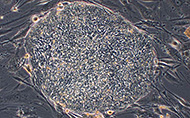Our Mission
The union of sperm and egg, two highly differentiated cell types, gives rise to the zygote — the totipotent cell. The zygote has the potential to form every cell type of the embryo and the adult organism through a series of hierarchical cell fate decisions that involves cell-cell interaction and signaling called embryonic induction. Dr. Brivanlou wants to decipher the molecular circuitry that underlies the establishment of discrete cell fate during early vertebrate embryogenesis.
The Brivanlou lab’s research focuses on the molecular events and cellular interactions that regulate the emergence of key structures in the early embryo. Most of the work in his laboratory focuses on the molecular basis of cell fate specification and patterning during early embryonic development. The ultimate objective of the work is to understand the molecular circuitry underlying embryonic induction, with a special emphasis on the formation of the nervous system. Toward this aim, he performs comparative studies using both amphibian and mammalian model systems, including human embryonic stem cells (hESCs).




